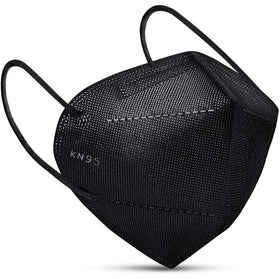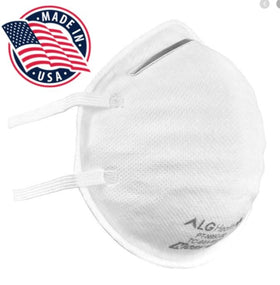Are KN95 face masks effective against COVID-19/coronavirus particles?

Since COVID-19 has swept across the globe, there’s been conflicting information about precautions and how to stay safe. Face masks, in particular, have divided individuals and countries alike, with some nations implementing mandatory face masks, while others claiming they are not really effective as they can’t capture the COVID-19 particles.
We decided to fact check this claim:
There’s already research being done on the effectiveness of face masks against coronavirus, particularly the KN95 and N95 masks. The most widely cited concern is that face masks are simply not good at capturing and blocking coronavirus particles. To see whether that is the case, we first need to address the issue:
How big are Covid-19 particles?
A study from late January 2020 was the first to identify the size of a coronavirus particle with the help of electron microscopy. The team discovered that the COVID-19 virions—the scientific name for “virus particles”—are approximately 0.125 microns (125nmn) in diameter, with the smaller particles being as tiny as 0.06 microns and the larger ones reaching 0.14 microns.

Are face masks effective against the Coronavirus particles?
Given the relatively small size of coronavirus particles and the thin materials masks are made of, skeptics have voiced out concerns about the effectiveness of face masks. Business Insider, for instance, claimed that face masks probably “won’t protect you”, as N95 respirators can only prevent their wearers from breathing in particles that are bigger than 0.3 microns in diameter.
The good news is that we don’t have to rely on “probably” because a team of researchers from the University of Edinburgh has already conducted the tests for us. The scientists tested a set of different common masks and compared the performance of dust respirators, cycling masks, surgical masks, and even a cotton handkerchief. The team ran a diesel generator to mimic exhaust fumes and piped the exhaust through the masks, then used a particle counter to see how many particles were captured by the mask. It’s important to note that the particle counter used in the study could measure particles as little as 0.007 microns (for reference, that’s about 10 times smaller than the diameter of the coronavirus particles).
The results found that the #M industrial filters successfully captured over 95% of all particles, even the 0.007-micron ones. Contrary to commonly spread misinformation, the surgical masks were also quite adept at blocking the particles: the research team found they kept 80% of the particles away.
There’s actually robust research pointing to the effectiveness of face masks against airborne viruses. A study published a few years ago compared the performance of N95 respirators against surgical masks and found that while surgical masks were less effective, the N95 respirators successfully captured 95% of virus particles. Even better: the study looked into two N95 masks who scored poorly in previous research and found that their effectiveness was compromised by less than 1% (that is, the two N95 masks with lower performance still captured 94% of virus particles).
But what about Coronavirus particles?
There’s actually robust research pointing to the effectiveness of face masks against airborne viruses. A study published a few years ago compared the performance of N95 respirators against surgical masks and found that while surgical masks were less effective, the N95 respirators successfully captured 95% of virus particles. Even better: the study looked into two N95 masks who scored poorly in previous research and found that their effectiveness was compromised by less than 1% (that is, the two N95 masks with lower performance still captured 94% of virus particles).
Doesn't the air just leak in from the sides of the mask?
That’s a common question and a valid concern. To take advantage of the protection face masks offer, you need to ensure they provide a good enough fit, of course. There is actually research done to find out how well common masks fit. The teams usually utilize a fit-test machine, which comprises a blue tube that samples the air outside the mask, and a white tube that samples the air inside it. The machine then compares the input to find out how successful masks are at keeping the airborne particles away.
According to an experiment done, several of the 3M masks they used captured over 99% of particles, including those as small as 0.01 microns (10 times smaller than the COVID-19). Surgical masks were also effective, capturing 63% of particles even when they were put on people’s faces.

Summary - Can masks protect you from the CoronaVirus?
The short answer is: ABSOLUTELY.
Masks successfully filter particles down to the size of 0.007 microns, which is 10 times smaller than viruses, including the COVID-19. Different masks have different effectiveness, with KN95 and N95 respirators leading the race, but surgical masks have surprisingly good performance too, which makes them a suitable alternative when other masks are not available. The bottom line is: face masks can certainly capture the coronavirus particles and protect you and your family amidst the pandemic.
N95 Medical Supplies is a leader in protective equipment and PPE and a very active member and participant in donating within communities. We hope you learned from this information and will consider our company for your important needs.
Zackary Hurley - CEO OF N95 MEDICAL SUPPLIES


